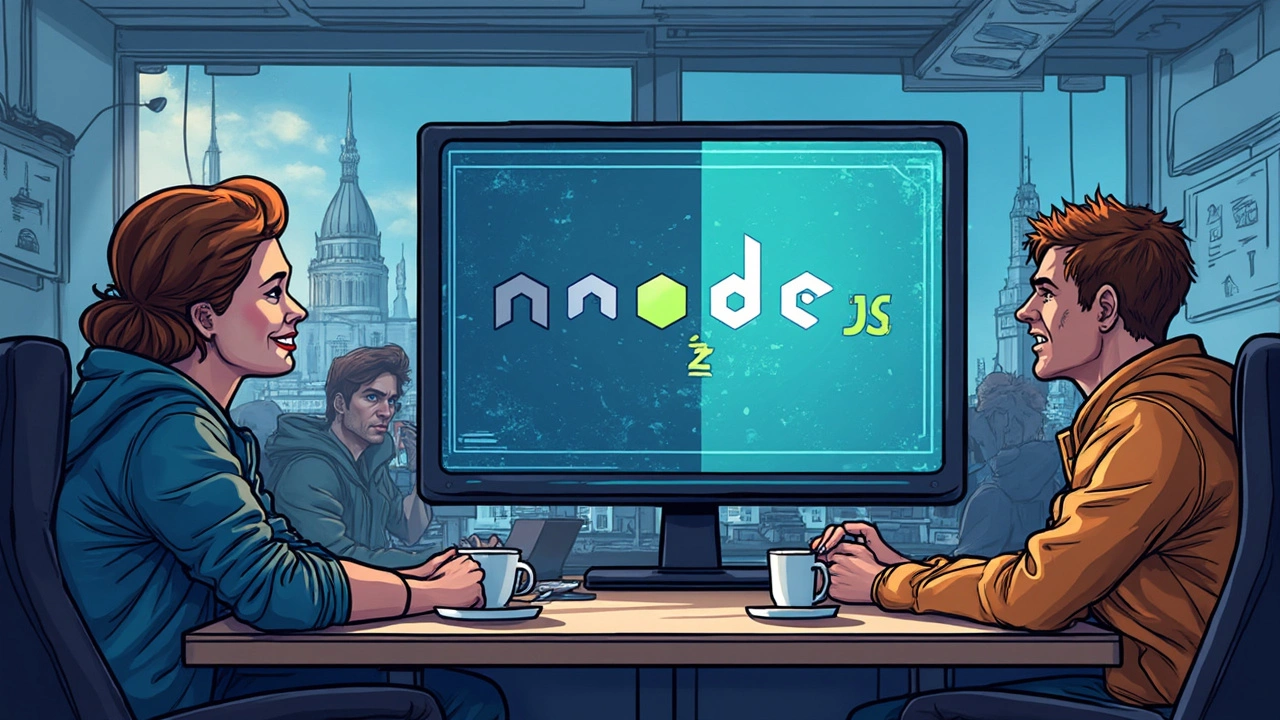
Why Big Companies Avoid PHP: 7 Key Reasons
23 Oct 2025Explore why major enterprises often skip PHP, covering performance, security, talent gaps, tooling, and real‑world case studies to help you decide if PHP fits your big‑company project.
If you’ve ever browsed a site that feels fast, dynamic, and cheap to host, chances are PHP is behind the scenes. It’s the language that runs WordPress, Drupal, and countless custom apps. Even with newer stacks popping up, PHP still powers over 75% of the web, so learning it isn’t a hobby—it’s a solid career move.
First off, PHP is easy to set up. A single LAMP (Linux, Apache, MySQL, PHP) stack can be installed on any desktop, letting you build and test locally without a cloud account. The language’s syntax mirrors plain English, so beginners stop scratching their heads after a few lines.
Second, the ecosystem is massive. From the tiny Slim micro‑framework to the full‑featured Laravel, you can pick the right tool for any project size. Documentation is plentiful, and forums like Stack Overflow have answers for almost any error you’ll hit.
Third, job boards still list PHP as a top skill for backend roles, especially in agencies that manage WordPress sites. Companies love PHP because it’s cheap to host and proven for high‑traffic sites. In short, you get a low barrier to entry, a ton of real‑world use, and decent pay.
1. Install a local server. Grab XAMPP (Windows/macOS) or MAMP (macOS) and fire it up. It bundles Apache, MySQL, and PHP so you can start coding instantly.
2. Write your first script. Create a file called hello.php and add:
<?php
echo "Hello, PHP!";
?>Place it in the htdocs folder and visit http://localhost/hello.php. If you see the text, you’re in business.
3. Learn the basics. Focus on variables, arrays, loops, and functions. Sites like PHP.net have clear examples, and the “PHP for Beginners” tag on our blog offers bite‑size posts that walk you through each concept.
4. Pick a framework. If you want to build larger apps, Laravel is the go‑to choice. Its routing, Eloquent ORM, and Blade templating make everyday tasks painless. Follow the official “Laravel 10” starter guide, and you’ll have a CRUD app up in a day.
5. Connect to a database. PHP’s PDO extension lets you talk to MySQL safely. A quick PDO snippet looks like this:
$pdo = new PDO('mysql:host=localhost;dbname=test', 'user', 'pass');
$stmt = $pdo->query('SELECT * FROM users');
while ($row = $stmt->fetch()) {
echo $row['email'];
}Understanding how to fetch and display data is the heart of most web apps.
6. Secure your code. Never trust input. Use filter_input() for sanitizing, and always prepare statements to avoid SQL injection.
7. Deploy. When you’re ready, move your code to a cheap shared host that supports PHP, or spin up a VPS with Docker. A simple git push and a few composer install steps are all you need.
Lastly, stay updated. PHP releases a new major version roughly every year—PHP 8.3 added enums and improved JIT performance. Subscribing to the “PHP News” tag on our site keeps you in the loop without the noise.
Whether you’re after a freelance gig, a full‑time job, or just want to tweak a WordPress theme, PHP gives you the tools to turn ideas into live sites. Grab a local environment, write your first script, and watch the web come alive under your fingertips.

Explore why major enterprises often skip PHP, covering performance, security, talent gaps, tooling, and real‑world case studies to help you decide if PHP fits your big‑company project.

Discover how to connect Python with PHP, run scripts, exchange data, and boost your web projects with real-life examples and clear steps.

Trying to decide between learning JavaScript or PHP? This article breaks down where each language shines, their job markets, and how they fit into modern web development. Find out which language best matches your interests and goals. Get real tips on starting out, plus some interesting facts you might not have heard before. No fluff—just practical advice you can actually use.

Is NodeJS about to take over PHP, or do both have their place in the web world? This article breaks down what makes NodeJS different from PHP, why some developers are making the switch, and where PHP still holds its ground. You'll get real-world facts, practical tips, and a no-nonsense look at which tool works best for different project types. Walk away knowing when to use NodeJS, when to stick with PHP, and how to future-proof your choices. Expect clear info, not hype.

Trying to decide between PHP and Python for backend development? This article breaks down their core differences, real-world uses, and how each one fits with modern web projects. You'll find practical tips on job opportunities, learning curves, and common pitfalls. Whether you're switching careers or picking your first language, the insights here are grounded in today’s market. Find out which option makes the most sense for your own goals and interests.

This article breaks down whether you really need to know PHP to work with WordPress. It covers how PHP fits into the WordPress ecosystem, what tasks require PHP knowledge, and when you can get by without it. Expect real examples and straight talk—no fluff. There are tips for beginners who want to get started, as well as pointers for growing their skills. Find out when knowing PHP pays off, and when you can rely on other tools.

PHP is a widely-used scripting language, but have you ever wondered about the language that builds PHP itself? The answer is C language. This article explores how PHP, a server-side scripting language, is developed using the C programming language, offering insights into its efficiency and widespread adoption. It unveils PHP's history, the role of C in its development, and interesting tidbits for developers.

PHP, once the darling of web developers everywhere, is now seeing a decline in its usage. While it still powers many websites, developers are gravitating towards newer languages for various reasons. This article explores why PHP is losing its appeal, examining technological advancements and changing preferences in the developer community. From performance issues to evolving industry standards, we delve into what's causing the shift away from PHP while providing insights into the future of web development.

PHP and Python are two popular programming languages used in web development, each with its strengths and applications. PHP is renowned for its prowess in server-side scripting and content management systems like WordPress. Python, on the other hand, is celebrated for its versatility, ease of learning, and wide range of applications, from web apps to data science. While both languages remain relevant, choosing one depends on specific project needs and developer preference.

As of 2024, WordPress continues to utilize PHP as its primary scripting language, maintaining its widespread popularity and reliability. The language forms the backbone of the CMS, supporting its vast ecosystem of plugins and themes. Despite advancements in other technologies, PHP remains integral to WordPress due to its stability and extensive community support. This article explores the reasons behind this continued alliance, examines technological shifts, and provides insights into future prospects.